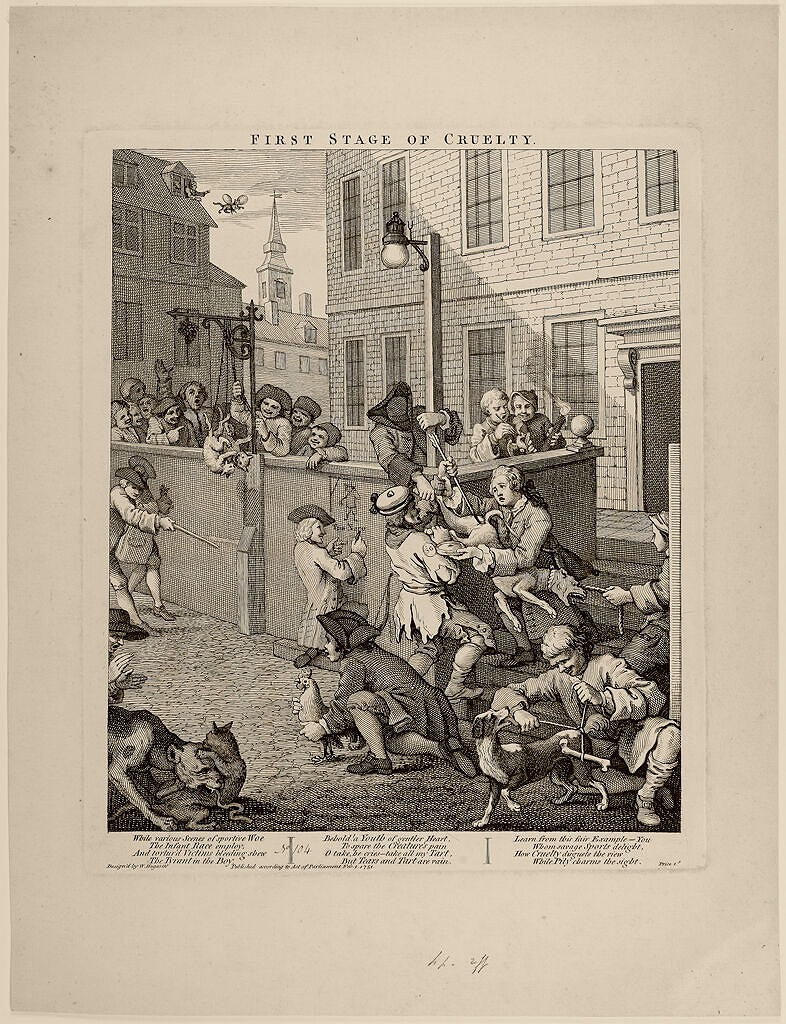The First Stage of Cruelty

William Hogarth: The First Stage of Cruelty (1751)
Series/Book Title: The Four Stages of Cruelty
Alternate Title: The Four Stages of Cruelty, Plate 1.
"I'm asking for a dear friend of mine and yours."
The initial stage of cruelty must come subtly if it's to be sustained. Too overt an entry can shock even partisans into premature recognition. It ideally occurs against some other, preferably one long-reviled. The torturer often targets minorities for precisely this reason. The best victims naturally have the fewest supporters. Some leakage remains unavoidable, though, scrupulously one designs their offensive. Remember, cruelty is inherently offensive. It will seem at least somewhat repulsive to every witness, even the most thoroughly enthralled. The executioner, therefore, has, by long practice, characterized himself as the greatest victim in the transaction. "Poor Henry, whose fate calls for him to behead people for a living!" In extreme cases, the director of the cruelty can comfortably characterize himself as the worst off for the experience. Just imagine! He has to forever live with the memory of the execution while the victims hardly felt a thing as they exited.
The psychology does not seem terribly complicated. It's standard Bully behavior all the way. One merely transforms a relationship into a transaction on terms utterly dominated by the one transforming. Brothers become targets, and relatives easily become enemies. Any superficial difference that might amplify the obvious will do. Typically, the more superficial, the more effective. Skin color has been a perennially popular target. It's easily identified and even more easily vilified, for it remains the most prominent superficiality of any that might have been chosen. One merely renders the trivial material. Inenudo might best transform this stuff, for it leaves by far the fewest fingerprints. Ascribing an evil as having been identified by unnamed others allows for arm's length reference. "Many believe." "Most have said." Common sense might also be usefully employed since few will question what they should have known was common knowledge. To admit not knowing identifies one as not belonging, and belonging might be the only helpful defense during The First Stage of Cruelty.
The cruel act might be best characterized as a gift rather than any infliction or, heaven forbid, punishment. Reuniting or repatriating comes off as far superior to deporting. Reconnecting someone to their homeland might seem beneficial. This frame easily overshadows the otherwise unsettling fact that they were detained without the benefit of a warrant or, that their arrest and removal occurred extra-judicially, without evidence, or that their deportation occurred without respecting their sacred right to trial or appeal. The partisans will insist that the police always had the right to arrest and punish anyone on mere suspicion as if the Alien and Sedition Acts had not expired after eighteen hundred. This underlying notion should properly terrify every citizen, for it might ensure that anyone could be so insulted without exciting any organized opposition. It means that anyone could become a target for any trumped-up reason or, really, for no reason at all.
The cruelest aspect of The First Stage of Cruelty must be that it appears to exclusively occur on a whim. There need not be any strategy behind it. The absence of strategy may even be its most powerful aspect. No pattern of abuse could emerge from any random series except by projection, which might be conveniently discounted. If the inclusion rules constantly change, anticipation becomes impossible. If the actual targets shift, however slightly, every organized defense might be rendered useless. This tactic might even seem to be the cruelest to themselves, as insiders inevitably catch on to what's been foisted onto an innocent populace. Those so-called turncoats who participated in the planning before realizing that they shouldn't have agreed to sign on must be most vehemently and preemptively punished so that the general populace never believes their testimony. They might hold the key to unraveling the cruelty, though their reputation would have been quite deliberately shattered before their story could be fully public.
It's at least humbling to recognize how few of us hold very much courage behind our convictions. Most of us had become essentially convictionless under the continual pressure to conform or suffer unreasonable consequences. Many of us shudder to acknowledge that we should have been standing up all along but that some vestigial fear encouraged us to continue sitting down. How the opposition assumed their present sorry position might be explained by our own complicity, unintended but nonetheless contributory. Were we as visible as we intended to be? Did we find the opportunity to attend the city and the county commissioner meetings and to publicly voice our honest opinions on popular issues? Were we terrified enough of contributing to some divide that we missed the chance to co-opt cruelty before it blossomed and set seed? What must we do now that we finally recognize we're well into that terrible First Stage of Cruelty? I'm asking for a dear friend of mine and yours.
©2025 by David A. Schmaltz - all rights reserved


